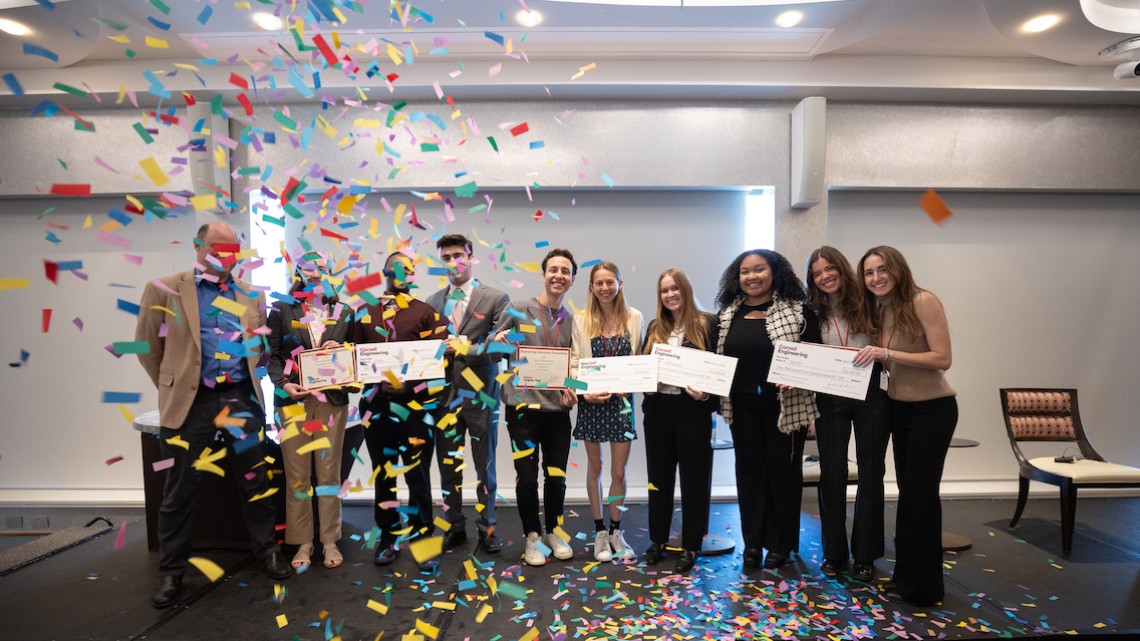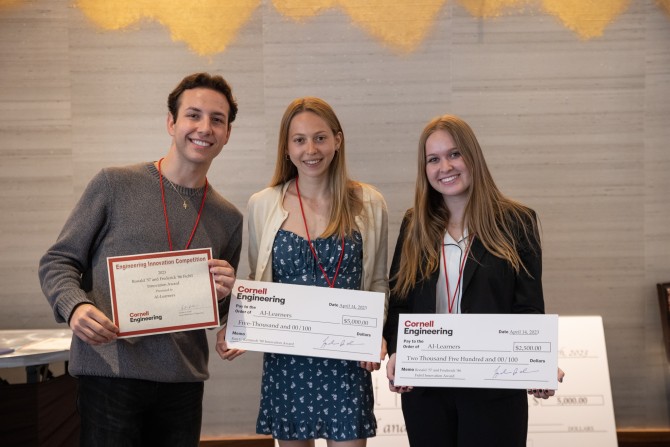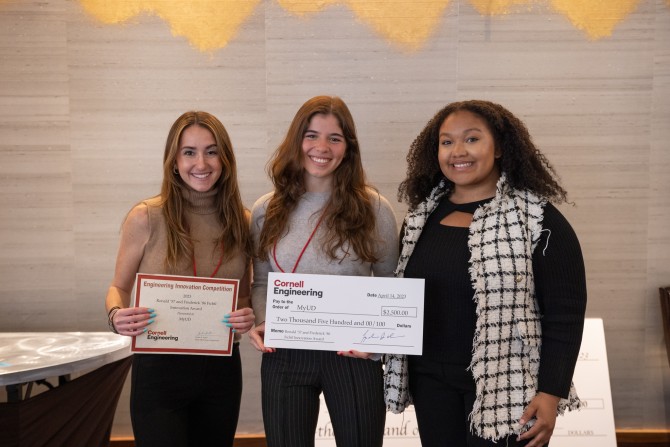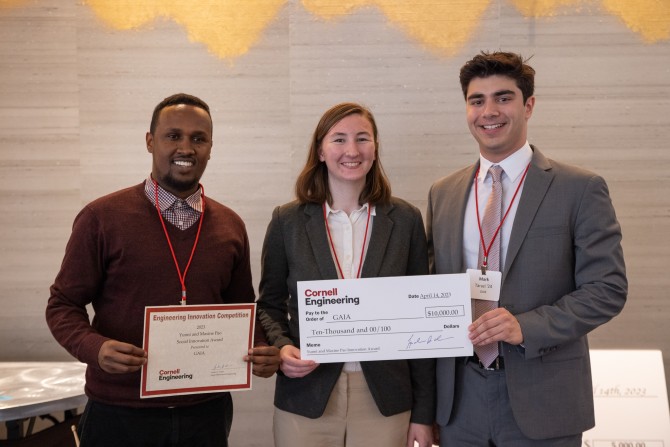
Student winners of the Cornell Engineering Innovation Competition were announced during an event on March 23, 2023.
News directly from Cornell's colleges and centers
AI ed-tech, smart contraceptive among innovation awardees
By Patrick Gillespie
Cornell Engineering has announced the winners of its seventh annual Engineering Innovation Competition designed to encourage and recognize independent work from undergraduate students working on innovative product concepts and prototypes outside of the classroom.
“The prize money won from the competition supports the teams in the next stages of development of their real-world ideation and concept demonstration experiences,” said David Putnam, associate dean for innovation and entrepreneurship at Cornell Engineering. “This competition enables students who win the awards to continue with their goal of bringing new products to market.”
Thirteen teams submitted written applications and short videos. From those, 10 teams were selected to make final presentations on March 24 in front of a panel of judges.
The winners are:
First place and best prototype: AI-Learners
- The Ronald ’57 and Frederick Fichtl ’86 Innovation Award for the most innovative and best developed concept, funded by Burt Kaliski and Michele Kaliski ’85.
- The Ron G. Kermisch ’88 Award for an entry that includes the implementation of a complex innovation as a fully demonstrated physical prototype, funded by Ron G. Kermisch ’88.
AI-Learners is an educational technology platform that helps students with physical, cognitive and behavioral challenges learn math through personalized online games and analytics. AI-Learners provides more than 70 games in the preK through second-grade level to help students improve in counting, operations, geometry and logical reasoning.
“AI-Learners is the first website that is specifically designed to meet the complex needs of students with physical cognitive and behavioral disabilities,” said Adele Smolansky ’23 a computer science student at Cornell Bowers CIS as well as CEO and founder of AI-Learners. “Following the highest level of accessibility guidelines, we use machine learning techniques to personalize games to each student's math levels.”
In addition to Smolansky, the team members included Juan Delgado ’24, Alexa Prague ’25, Isabel Pangestu ’24, Sahar Sami ’23, Sophia Tan ’23 and Alice Hryhorovych ’24.
Second place: MyUD
- The Ronald ’57 and Frederick Fichtl ’86 Innovation Award for the second most innovative and best developed concept, funded by Burt Kaliski and Michele Kaliski ’85.
The MyUD is a smart intrauterine contraceptive device and an improvement upon an existing hormonal IUD. This device would alert the user if the IUD has moved above the “safe” threshold or is in a dangerous position, notifying the patient when she should seek medical help to avoid any serious complications.
“Our device is intended to provide women with the potential to have more control over their bodies and reproductive decisions,” said Danielle Frye ’23. “The MyUD is directed towards all women who currently make use of the IUD as their long-term contraceptive, as well as women who may consider getting one in the future.”
The MyUD team consists of biomedical engineering students Molly Eron ‘23, Frye, Katie McGarty ‘23, Veronica Vila ’23, and Chenglin Zhu ’23.
Social Innovation Award: Global Action Impact Association
- The Yunni and Maxine Pao Social Innovation Award for a multi-disciplinary social venture which has developed an innovative solution aimed at solving a pressing global challenge, funded by Carolyn Wang ’00 and Jeff Pao ’00.
The Global Action Impact Association (GAIA) is a national competition that empowers college students to design and execute high-impact solutions for global sustainability, transforming academic theory into tangible impact. For its first year, GAIA will fund the cost of travel and materials of the winning team to implement their wind turbine design in Peru.
GAIA’s team consists of Mohamed Aden ’23, M.Eng. ’23, Mark Tarazi ’24, Rebecca Mccabe Ph.D. ’26, Lauren Chuhta ’26.
“Our future plan for GAIA is for all colleges to have a chapter, so they can compete in this national competition and actually execute their own prototypes in a developing country,” said Tarazi, a mechanical and aerospace engineering student. “The scoring for the competition is based on impact meaning how much their prototypes are going to impact real communities. Every year the topic changes, according to the United Nations’ sustainable development goals. Our goal for GAIA is for college students to come together in order to execute high impact solutions for global sustainability in order to make the world a better place.”
Media Contact
Get Cornell news delivered right to your inbox.
Subscribe



